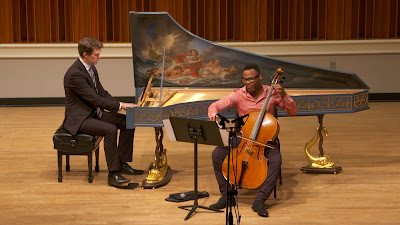The penultimate weekend of the Indianapolis Early Music Festival features two different pairings of string instrument and harpsichord
 |
| Patrick Merrill (left) and Wade Davis performing at Indiana History Center. |
Both instrumental programs paid tribute to the prominence of vocal music in the 17th and 18th centuries. Sunday's concert, with cellist Wade Davis and harpsichordist Patrick Merrill performing under the ensemble name of S'amusant, reached back further in that category. It opened with their arrangement of the hymn "O ignee Spiritus" by Hildegard of Bingen, a 12-century German visionary regarded as the foremother of all female composers in the Western art tradition.
The arrangement was tasteful and not excessively gussied up. The players, in adding to the monodic line of the original, stayed true to the mood of highly focused reverence for the Holy Spirit. In the main repertoire the Baltimore ensemble concerns itself with, the aria "Io veggio i campi verdeggiar fecondi" followed in confirmation of the duo's well-cultivated rapport, with particular luster in Davis' glowing lyricism. The lyricism seemed a little too precious to me in his solo, the Prelude from J.S. Bach's second cello suite. But the cellist's musical personality made the interpretation mostly convincing, and his tone was exquisite.
Friday's virtual concert, by violinist Ingrid Matthews and harpsichordist Byron Schenkman,
was titled "Handel and the Italians in England," indicating the vogue for Italian opera and instrumental styles nurtured and sustained in the early decades of the 18th century by the imported and most welcome genius of George Frideric Handel (to use the English version of his name the composer adopted after moving to England in 1710).
Schenkman and Matthews paid tribute to the enormous success of Italian opera among English audiences (tolerating and for a while loving music sung in a language they couldn't understand), with the violinist taking the vocal part of "Amarti si vorrei," the heroine Agilea's lamenting aria in "Teseo" (1713). Lifting up such a crucial part of Handel's reputation in his adopted homeland in the middle of this performance created the opportunity for two Handel violin-keyboard sonatas to represent the transplanted German at either end of the recital, which also featured characteristic pieces by Geminiani, Scarlatti, and Elisabetta de Gaberini (also a singer of distinction in Handel oratorios).
As for the more recent recital, I found the S'amusant duo especially impressive in Giovanni Bononcini's Sonata for Cello and Continuo, whose two-movement breadth of expression and texture was most welcome in a recital that verged on the sparse side. Despite the seriousness of the two harpsichord solos Patrick Merrill offered, the brevity of the selections and of the concert itself gave a sampler kind of flavor to the occasion.
Admirable and generally well brought off was Davis' advocacy of Joseph Boulogne, Chevalier de Saint-Georges, the most eminent early composer of African descent to come to attention currently; the recently revived Indianapolis Symphony Orchestra was a concert advocate for him in May. An Allegro movement from his Sonata in G minor gave, despite a few flat high notes, a fitting flourish to S'amusant's local debut.




Comments
Post a Comment